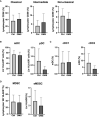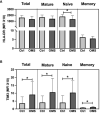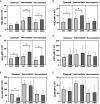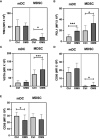Osteomyelitis is associated with increased anti-inflammatory response and immune exhaustion
- PMID: 38736874
- PMCID: PMC11082283
- DOI: 10.3389/fimmu.2024.1396592
Osteomyelitis is associated with increased anti-inflammatory response and immune exhaustion
Abstract
Introduction: Osteomyelitis (OMS) is a bone infection causing bone pain and severe complications. A balanced immune response is critical to eradicate infection without harming the host, yet pathogens manipulate immunity to establish a chronic infection. Understanding OMS-driven inflammation is essential for disease management, but comprehensive data on immune profiles and immune cell activation during OMS are lacking.
Methods: Using high-dimensional flow cytometry, we investigated the detailed innate and adaptive systemic immune cell populations in OMS and age- and sex-matched controls.
Results: Our study revealed that OMS is associated with increased levels of immune regulatory cells, namely T regulatory cells, B regulatory cells, and T follicular regulatory cells. In addition, the expression of immune activation markers HLA-DR and CD86 was decreased in OMS, while the expression of immune exhaustion markers TIM-3, PD-1, PD-L1, and VISTA was increased. Members of the T follicular helper (Tfh) cell family as well as classical and typical memory B cells were significantly increased in OMS individuals. We also found a strong correlation between memory B cells and Tfh cells.
Discussion: We conclude that OMS skews the host immune system towards the immunomodulatory arm and that the Tfh memory B cell axis is evident in OMS. Therefore, immune-directed therapies may be a promising alternative for eradication and recurrence of infection in OMS, particularly in individuals and areas where antibiotic resistance is a major concern.
Keywords: T follicular helper cells; immune exhaustion; infection; inflammation; musculoskeletal immunology; osteomyelitis.
Copyright © 2024 Surendar, Hackenberg, Schmitt-Sánchez, Ossendorff, Welle, Stoffel-Wagner, Sage, Burger, Wirtz, Strauss and Schildberg.
Conflict of interest statement
The authors declare that the research was conducted in the absence of any commercial or financial relationships that could be construed as a potential conflict of interest. The author(s) declared that they were an editorial board member of Frontiers, at the time of submission. This had no impact on the peer review process and the final decision.
Figures










References
Publication types
MeSH terms
Substances
LinkOut - more resources
Full Text Sources
Research Materials

